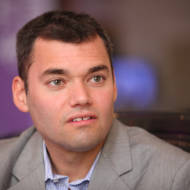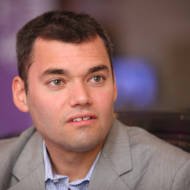
Once upon a time, Beinart hoped that he “could remain a liberal and a supporter of Jewish statehood at the same time.” That time has clearly passed.
By Jerold Auerbach, The Algemeiner
Nearly a decade ago, Peter Beinart, a journalist with impeccable leftist credentials, authored a New York Times column titled “To Save Israel, Boycott the Settlements.” His settlement animosity, admirers will appreciate, remains undiminished. But his salvation solution has now reached the outer margins of fantasy.
His newest iteration, once again in the newspaper that eagerly embraces any critique of Israel, testifies to his abiding discomfort with the very idea, let alone the reality, of a “Jewish” state in the Biblical homeland of the Jewish people.
Once upon a time, Beinart hoped that he “could remain a liberal and a supporter of Jewish statehood at the same time.” That time has clearly passed. The pivotal “event” in his transformation has been the return of Jews to Judea and Samaria, previously known as Jordan’s “West Bank,” following the Six-Day War in 1967. Some 640,000 Jewish “settlers” now inhabit eastern Jerusalem and the West Bank — for Beinart, forbidden territory to Jews. And the West Bank even “hosts Israel’s newest medical school.” A shanda!
Since, in Beinart’s view, Israel has decided to become “one country that includes millions of Palestinians who lack basic rights,” it is “time to imagine a Jewish home that is not a Jewish state.” His imagination leads Beinart to fantasize that “equality could come in the form of one state that preposterously includes Israel, Judea and Samaria, the Gaza Strip, and eastern Jerusalem.” He cites Palestinian advocate Edward Said — more than once — as his favored source.
Beinart fancifully imagines that his plan “is not fanciful.” Rather, he has decided, “one equal state” is the preference of “young Palestinians” and “young Americans, too.” Young Israelis are inconsequential. The reason it can work is that Israel “is already a binational state” where two peoples “live under the control of one government.” Beinart’s cited models for success are Northern Ireland and South Africa.
Beinart is reassured that Rabbi Michael Melchior, a former Knesset member who wishfully claimed that Hamas leaders were ready for peaceful coexistence with Israel, is convinced that “Palestinians will live peacefully alongside Jews when they are granted basic rights.” To date, however, the Palestinian Authority, not known for its democratic values, has yet to grant them.
Beinart remains loyal to the vision of his grandfather and father: “not a Jewish state but a Jewish society, a Jewish home.” And his “Israel-Palestine can be a Jewish home that is also, equally, a Palestinian home.” That would “bring liberation not just for Palestinians but for us, too.”
Who “us” is, aside from Beinart, remains unidentified.
Beinart’s vision of “Israel-Palestine” is developed more fully, and even less persuasively, in Jewish Currents, the progressive quarterly that he edits. He insists that Jewish statehood “has long been precious” to him. But not, apparently, since the Six-Day War, when it became a source of discomfort deserving of his unrelenting criticism.
Once Prime Minister Netanyahu vowed to “annex” — more accurately, to extend sovereignty over — a segment of Judea and Samaria, land that Beinart claims has been “brutally and undemocratically controlled” by Israel ever since 1967, he began to change his mind.
Wearing leftist blinders, he fails to notice that Palestinians have repeatedly rejected that possibility. The Trump “peace plan,” with “its implicit acceptance of [limited] Israeli annexation,” has intensified Palestinian support for “armed struggle.” Beinart fails to note that for decades the predictable Palestinian response to the Jewish state, even without annexation looming, has been armed struggle, otherwise known as terrorism. Since independence in 1948 these attacks have murdered 3,155 innocent Israeli citizens.
For as long as Israel is seen by liberal American Jewish intellectuals among countless others as the repressive occupier of someone else’s land, any chance of conflict resolution is virtually nil. What then is Beinart’s solution? Succinctly: “a Jewish home that is a Palestinian home, too.” Why? Because a two-state solution — inevitably “a fragmented Palestine under de facto Israeli control” — “no longer provides hope.”
Beinart is impressed that “growing numbers of Palestinians have embraced the idea of one state in which they enjoy equal rights” with Israelis. But Israeli leaders are inclined “to inch closer to policies of mass expulsion” — at least according to his primary sources: revisionist historian Tom Segev and Haaretz correspondent Amira Hass (who has chosen to live in Gaza and Ramallah over Israel).
With ideological guns firing, Beinart anticipates that Israeli annexation of 30% of Judea and Samaria is “a waystation on the road to hell” as “oppression degenerates into ethnic cleansing.” He seems oblivious to the fact that nothing in the Trump/Netanyahu plan even remotely resembles ethnic cleansing. It divides the West Bank with 30% for Israelis and the remainder for Palestinians. If anything, Israel would be short-changed, deprived of 70% of its Biblical homeland.
Enraptured by his fantasy of “democratic binationalism in Israel-Palestine,” Beinart insists that “Only Palestinian freedom … can make Jews whole.” It may be a shanda for Beinart, but it is surely a cause for Israeli celebration that a Jewish state in a significant part of the Biblical homeland of the Jewish people draws closer to fulfillment of the Zionist dream.
Jerold S. Auerbach is the author of “Print to Fit: The New York Times, Zionism and Israel 1896-2016,” selected by Ruth Wisse and Martin Kramer as a Mosaic Best Book for 2019.
JOIN US IN PLANTING FRUIT TREES IN THE LAND OF ISRAEL!
ISRAEL’S SUMMER PLANTING SEASON IS RIGHT NOW!
Make the Land of Israel even more beautiful and fruitful while helping Israeli farmers to recover from financial losses due to coronavirus and destructive Hamas arson fires.
“…for the Lord your God is bringing you into a good land… a land of wheat and barley, vines, figs and pomegranates, a land of olive oil and honey”
(Deuteronomy 8:7-8)
Source: United with Israel

